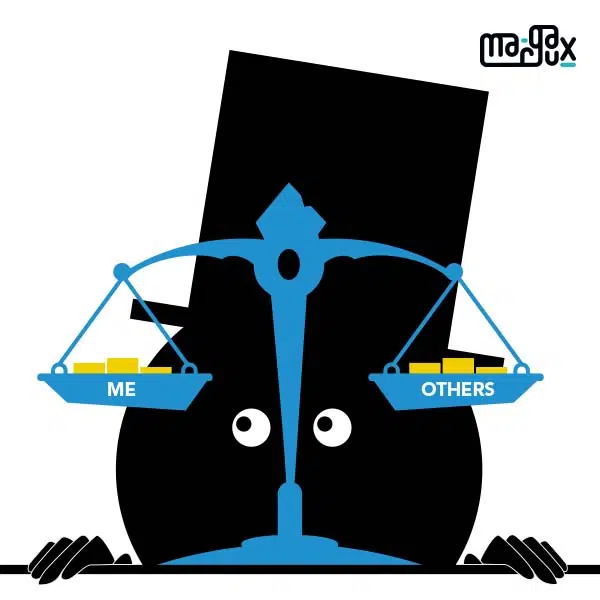Among the Western companies that have left Russia, some, like Danone, have been expropriated or nationalised (1). Thus, in the words of its half-yearly financial report for 2023, “Danone has taken note of the decision of the Russian authorities [of July 16, 2023] aiming at placing Danone Russia (Essential Dairy and Planted-based) under the temporary external administration of the Russian Federal Agency for State Property Management (Rosimushchestvo)” (2). The hypothesis of a compensation does not seem to be envisaged, and Danone “keeps investigating how to protect its assets and its rights as shareholder” (3). A situation such as this not only gives rise to economic, political and diplomatic analyses, but also to moral analysis. This could mobilise a moral principle that seems particularly relevant in this case: the “Principle of equal consideration of interests.”

It goes without saying that the temporary expropriation of Danone in Russia (4) raises moral questions that stem both from the circumstances in which it took place and from the conditions that make expropriation legitimate – it being understood, as the researcher Olajide Akinleye-Martins reminds us, that every State “has a right to control property and economic resources within its territory for the enhancement of its objectives be they economic, political or otherwise” (5).
As to circumstances, Groupe Danone announced on October 14, 2022 that it would be transferring control of its activities and looking for a local buyer (6). However, the publication of the decree announcing the placing of almost all its activities under temporary external administration caught the company unawares (“These changes took place without the knowledge of, or approval by, Danone”), rendering futile the efforts the company had made – efforts which, moreover, seemed to meet with the approval of the Russian authorities (7).
As far as conditions are concerned, an expropriation is justified or legitimate if it is “not discriminatory against the investor,” is done for a public purpose, is “done in accordance with due process of law” and is “accompanied by prompt, adequate and effective compensation to the foreign investor” (8). Expropriations and nationalisations are governed, in principle, by International Investment Law, the purpose of which is “to promote and protect the activities of private foreign investors” (9).
At the time of writing, we have no information on possible compensation for Danone, but it is likely to be nil (10). As for the “public purpose” of the expropriation (its contribution to the general well-being of the Russian population), the calculation of which seems naturally to fall to the Russian state (11), it deserves particular comment.
On October 14, 2022, we reported that Danone had announced its intention to transfer control of its activities in Russia. The company felt that this was “the best option to ensure long-term local business continuity, for its employees, consumers and partners” (12). Moreover, the press reported that “in the wake of Vladimir Putin’s offensive in Ukraine, Danone [was] stating loud and clear: there is no question of punishing the Russian population by depriving them of essential goods” (13).
This concern for the public good is consistent both with Danone’s mission to “bring health through food to as many people as possible” (14) and with the aim of any state to maximise the well-being of its population. It is tempting to interpret this latter form of coherence as an “equivalence” between interests.
The philosopher Don Locke proposed the Principle of Equal Interests, which refers to this kind of equivalence: it consists in “giving equal weight to the equal interests of different people” (15).
This principle makes it possible to resolve the conflicts between divergent interests that, according to Locke, often underlie moral problems, the aim being to maximise the satisfaction of the interests of each of the people concerned (16). The method is to “imagine ourselves in the position of the various parties to the conflict, with their interests in place of our own, and then combine their different points of view to arrive at that judgment which would give us more of what we would want, taking all those positions together, than any other.” Locke concludes that “if we can do this correctly, it will then be the solution which does most to satisfy the different interests of the different parties to the actual situation.”
This kind of method comes up against a difficulty, which Locke discusses in his article: how can we give equal weight to interests whose moral value may differ? If, in a choice situation, one person defends a position favorable to the protection of nature, while another defends a position involving the exploitation or destruction of nature, their interests are not equal in terms of value. It follows that, from a moral perspective, the Principle of Equal Interests presupposes equal respect for certain values (in our example, the protection of nature), which the person carrying out the evaluation should check before making his or her choice (just as he or she should check the rationality of the people concerned, and therefore the rationality of their interests).
If the well-being of the Russian population was a common concern for Danone and the Russian state, we might think that their interests were equal, making it possible to apply the Principle of Equality of Interests. However, its application should have resulted in maximising the satisfaction of Danone’s interests, including the granting of just compensation following the temporary expropriation. This was not the case, and it is one of the reasons the group has announced that it “keeps investigating how to protect its assets and its rights as shareholder” (17).
In the absence of a “supreme entity” charged with applying the Principle of Equality of Interests, such as an arbitral tribunal capable of ruling within the framework of International Investment Law (18), it was up to the Russian state to resort to Locke’s method to “imagine itself in the position of the various parties to the conflict,” or, in the same spirit, to use the philosopher Peter Singer’s method of, first, “accepting that ethical judgments must be made from a universal point of view,” and, then, “accepting that my own interests cannot, simply because they are my interests, count more than the interests of anyone else” (19).
There is a “supreme entity” of a theoretical and heuristic nature to which any decision-maker can appeal: the “impartial spectator” (20). Philosophers Ruwen Ogien and Christine Tappolet referred to this in connection with the principle of equal consideration, which they placed among consequentialist moral theories (21):
“The principle at the heart of most consequentialist conceptions is that of the equal consideration we owe to everyone. In determining what to do, the good that will result for a particular person counts for no more or less than the good that will result for any other person. This is what the utilitarian ‘Everybody to count for one, nobody for more than one’ sums up. Moreover, most consequentialists admit that the value of consequences does not depend on the point of view from which they are evaluated: there is no difference between the agent’s evaluation and that of an impartial spectator.” (22)
Before issuing the decree placing Danone under temporary external administration in Russia, the Russian state could thus have imagined what an impartial spectator would have done in the same circumstances, which would have (normally) led it to apply the principle of equal consideration of interests.
Of course, in the context of international relations, a fortiori when a war directly or indirectly pits the holders of interests against each other, this decision-making tool and, more generally, the recourse to moral imagination advocated by Locke and Singer, are of limited use. They may even seem irrelevant. But this does not deprive the principle of equal consideration of interests of its relevance to moral analysis. In the case of the temporary expropriation we have briefly discussed, it helps to express and clarify the injustice suffered by Danone. And this is in no way irrelevant.
References
(1) Both terms have been used. See in particular (in French) M. Audit, “L’expropriation de Danone en Russie : des sanctions s’imposent,” Les Echos, 27 July 2023, “Russie : la nationalisation de ses actifs prend Danone de court,” Le Figaro, 18 July 2023. These articles use both terms. The author of the second, law professor Mathias Audit, considers that “this is expropriation, if not nationalization.” On the Danone case in Russia, see “Danone : comment Poutine a fait main basse sur le géant français,” Le Point, 28 July 2023.
(2) “H1 Results: Solid first half of the year & making consistent progress on Renew Danone,” 26 July 2023.
(3) Ibid.
(4) We prefer to use the rather strange expression “temporary expropriation,” as Danone has emphasized the temporary nature of “external administration” and recalled that “while [it] no longer retains control of the management of its EDP operations in Russia, it remains their legal owner” (Ibid.).
(5) O. Akinleye-Martins, “The concept of expropriation in international investment law,” 2 March 2022.
(6) “Danone announces it plans to transfer the effective control of its ‘Essential Dairy and Planted-based’ business in Russia,” 14 October1982.
(7) “H1 Results…,” op. cit.
(8) O. Akinleye-Martins, op. cit.
(9) Ibid.
(10) See M. Audit, op. cit.
(11) Utilitarianism, conceived as a theory of public choice, assumes, according to Amartya Sen and Bernard Williams, that “a public agent, some supreme body which chooses general states of affairs for the society as a whole.” But rather than a single decision-making center, several would be conceivable. (A. Sen et B. Williams (eds), Utilitarianism and Beyond, Cambridge University Press, 1982.)
(12) “Danone announces it plans to transfer…,” op. cit. We italicize.
(13) “Danone : les coulisses d’une très chère retraite de Russie,” Le Figaro, 15 October 2022.
(14) Source: About Danone.
(15) D. Locke, “The principle of equal interests,” Philosophical Review, 90, 1981, pp. 531-559.
(16) The idea of maximisation enabled philosopher Richard Hare to assert that “giving equal weight to the equal interests of all the parties” leads to utilitarianism, whose principle of utility aims, in its classical version, to produce the greatest happiness for the greatest number (“Ethical theory and utilitarianism,” 1976, in A. Sen et B. Williams (eds), op. cit.).
(17) “H1 Results…,” op. cit.
(18) See Raymond Djolgou’s recent article, “Le droit applicable au différend dans l’arbitrage d’investissement : entre volonté des parties et office de l’arbitre,” Revue internationale de droit économique, 36(1), 2022, pp. 103-131.
(19) P. Singer, Practical Ethics, Cambridge University Press, 1993. See also note 11 above. Singer defines the principle of equal consideration of interests as follows: “We give equal weight in our moral deliberations to the like interests of all those affected by our actions. This means that if only X and Y would be affected by a possible act, and if X stands to lose more than Y stands to gain, it is better not to do the act.”
(20) On this “spectator,” whose origins can be traced back to Adam Smith, see “The ‘Montagne d’Or project,’ credibility and Adam Smith,” Philosophy & Business Ethics, 18 September 2018.
(21) Consequentialism is “the idea according to which it is the consequences of an action for the well-being of the beings concerned, and not the character of the agent or his or her motives, which must be taken into consideration when assessing the morality of this action” (C. Audard, Anthologie historique et critique de l’utilitarisme, Introduction to Volume III, Paris, PUF, 1999).
(22) R. Ogien & C. Tappolet, Les concepts de l’éthique. Faut-il être conséquentialiste ?, Paris, Hermann Editeurs, 2009.
To cite this article: Alain Anquetil, “The expropriation of Danone in Russia and the principle of equal consideration of interests,” Philosophy & Business Ethics, 26 September 2023.




